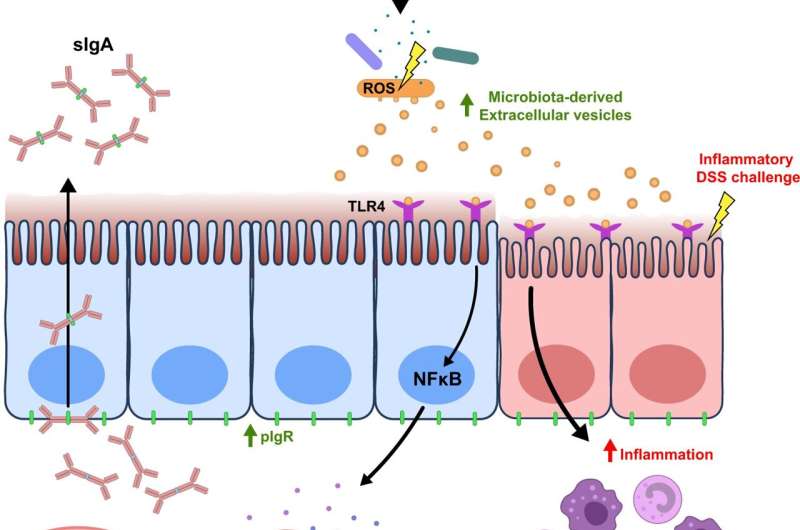
A model of high-protein diet in the induction of sIgA responses. A high-protein diet promotes the production of succinate by the gut microbiota. High levels of luminal succinate induce cellular stress and reactive oxygen species (ROS) production in gut bacteria, promote vesicle formation, and increase the production of microbiota-derived extracellular vesicles. Microbiota-derived extracellular vesicles directly activate TLR4 expressed in the intestinal epithelium and induce expression of APRIL, CCL28, and PIGR, which activates downstream NFκB signaling and promotes T cell-independent sIgA responses. Increase. Increased TLR4 signaling also enhances proinflammatory responses, leading to more severe DSS-induced colitis. The increased intestinal succinate observed in IBD patients may contribute to disease pathology by promoting the production of microbiota-derived extracellular vesicles and the TLR4/NFκB signaling pathway. credit: Nature Communications (2022). DOI: 10.1038/s41467-022-31761-y
A preclinical study at the University of Sydney found that a high-protein diet could alter the gut microbiome and trigger an immune response. He says he’s one step closer to understanding how it affects immunity.
“Our research focuses on how the gut microbiome—the trillions of bacteria that live in the gut—affects the immune system,” said the University’s Charles Perkins Center and School of Medicine and Health. Associate Professor Lawrence Macia said.
“Our ultimate goal is to understand how to manipulate bacteria to optimize health, and we know that one of the easiest ways to change your microbiome is to change your diet. increase.”
However, scientists have traditionally focused on the role of dietary fiber in maintaining a healthy gut.
In the first study of its kind, published in Nature Communicationsa team at the Charles Perkins Center used advanced modeling to investigate the effects of 10 diets with different macronutrient compositions, including proteins, fats and carbohydrates, in mice.
They found that a high-protein diet altered the composition and activity of the gut microbiota.
Mice fed a high-protein diet had increased production of bacterial extracellular vesicles, complex cargoes containing bacterial information such as DNA and proteins. The body then saw this activity as a threat and triggered a series of events in which immune cells migrated to the intestinal wall.
“Here we find that protein has a huge impact on the gut microbiota. It wasn’t about the type of bacteria that were there, it was about the type of activity. We have discovered a new way of communication between the gut bacteria and the host, mediated by proteins,” said Associate Professor Masia.
It’s too early to tell if the research applies to humans, but the researchers say that boosting the immune system could prove to be good news or bad news.
“By increasing antibodies in the gut, we may see strong protection against potential pathogens such as Salmonella, but on the downside, an activated immune system may be associated with colitis, inflammatory bowel disease, Or it could mean an increased risk of autoimmune diseases like Crohn’s disease, said lead author and postdoctoral researcher Jian Tan.
This result appears to be consistent with the impact of modern diets on the population, with lower rates of gastrointestinal infections and higher rates of chronic diseases in the Western world.
This advance in knowledge is made possible by the fusion of disciplines for which the Charles Perkins Center is famous.
This study utilized the nutritional geometric framework developed by Professors Steven Simpson and David Laubenheimer, which emerged from the study of ecology.
“The ‘Nutrient Geometry’ framework allows foods, diets, diets, and eating patterns to be plotted together based on their nutrient composition. We can observe patterns that are often overlooked in the associations between diseases,” Simpson said. , Academic Director of the Charles Perkins Center.
“This is the first time this model has been applied to immunology and could only have been realized here at the Charles Perkins Center. We look forward to seeing what happens next,” said Masia.
Diet beats drugs for anti-aging and metabolic health
Jian Tan et al, Dietary protein increases T cell-independent sIgA production through changes in gut microbiota-derived extracellular vesicles. Nature Communications (2022). DOI: 10.1038/s41467-022-31761-y
Courtesy of the University of Sydney
Quote: Uncovering the Links Between Diet, Gut Health and Immunity (August 3, 2022) August 3, 2022 https://medicalxpress.com/news/2022-08-uncovering-links-diet- Taken from gut-health.html
This document is subject to copyright. No part may be reproduced without written permission, except in fair trade for personal research or research purposes. Content is provided for informational purposes only.
